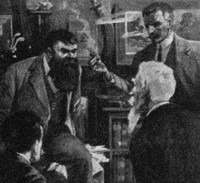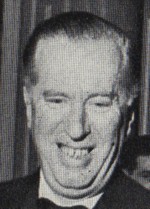|
Chapter V
THE DEAD WORLD
I remember that we all sat gasping in our chairs, with that
sweet, wet south-western breeze, fresh from the sea, flapping the
muslin curtains and cooling our flushed faces. I wonder how long
we sat! None of us afterwards could agree at all on that point.
We were bewildered, stunned, semi-conscious. We had all braced
our courage for death, but this fearful and sudden new
fact?that we must continue to live after we had survived the
race to which we belonged - struck us with the shock of a
physical blow and left us prostrate. Then gradually the
suspended mechanism began to move once more; the shuttles of
memory worked; ideas weaved themselves together in our minds. We
saw, with vivid, merciless clearness, the relations between the
past, the present, and the future - the lives that we had led and
the lives which we would have to live. Our eyes turned in silent
horror upon those of our companions and found the same answering
look in theirs. Instead of the joy which men might have been
expected to feel who had so narrowly escaped an imminent death,
a terrible wave of darkest depression submerged us. Everything
on earth that we loved had been washed away into the great,
infinite, unknown ocean, and here were we marooned upon this
desert island of a world, without companions, hopes, or
aspirations. A few years' skulking like jackals among the graves
of the human race and then our belated and lonely end would come.
"It's dreadful, George, dreadful!" the lady cried in an agony of
sobs. "If we had only passed with the others! Oh, why did you
save us? I feel as if it is we that are dead and everyone else
alive."
Challenger's great eyebrows were drawn down in concentrated
thought, while his huge, hairy paw closed upon the outstretched
hand of his wife. I had observed that she always held out her
arms to him in trouble as a child would to its mother.
"Without being a fatalist to the point of nonresistance," said
he, "I have always found that the highest wisdom lies in an
acquiescence with the actual." He spoke slowly, and there was a
vibration of feeling in his sonorous voice.
"I do not acquiesce," said Summerlee firmly.
"I don't see that it matters a row of pins whether you acquiesce
or whether you don't," remarked Lord John. "You've got to take
it, whether you take it fightin' or take it lyin' down, so
what's the odds whether you acquiesce or not?
"I can't remember that anyone asked our permission before the
thing began, and nobody's likely to ask it now. So what
difference can it make what we may think of it?"
"It is just all the difference between happiness and misery,"
said Challenger with an abstracted face, still patting his
wife's hand. "You can swim with the tide and have peace in mind
and soul, or you can thrust against it and be bruised and weary.
This business is beyond us, so let us accept it as it stands and
say no more."
"But what in the world are we to do with our lives?" I asked,
appealing in desperation to the blue, empty heaven.
"What am I to do, for example? There are no newspapers, so
there's an end of my vocation."
"And there's nothin' left to shoot, and no more soldierin', so
there's an end of mine," said Lord John.
"And there are no students, so there's an end of mine," cried
Summerlee.
"But I have my husband and my house, so I can thank heaven that
there is no end of mine," said the lady.
"Nor is there an end of mine," remarked Challenger, "for science
is not dead, and this catastrophe in itself will offer us many
most absorbing problems for investigation."
He had now flung open the windows and we were gazing out upon
the silent and motionless landscape.
"Let me consider," he continued. "It was about three, or a
little after, yesterday afternoon that the world finally entered
the poison belt to the extent of being completely submerged. It
is now nine o'clock. The question is, at what hour did we pass
out from it?"
"The air was very bad at daybreak," said I.
"Later than that," said Mrs. Challenger. "As late as eight
o'clock I distinctly felt the same choking at my throat which
came at the outset."
"Then we shall say that it passed just after eight o'clock. For
seventeen hours the world has been soaked in the poisonous
ether. For that length of time the Great Gardener has sterilized
the human mold which had grown over the surface of His fruit. Is
it possible that the work is incompletely done--that others may
have survived besides ourselves?"
"That's what I was wonderin'" said Lord John. "Why should we be
the only pebbles on the beach?"
"It is absurd to suppose that anyone besides ourselves can
possibly have survived," said Summerlee with conviction.
"Consider that the poison was so virulent that even a man who is
as strong as an ox and has not a nerve in his body, like Malone
here, could hardly get up the stairs before he fell unconscious.
Is it likely that anyone could stand seventeen minutes of it,
far less hours?" |






